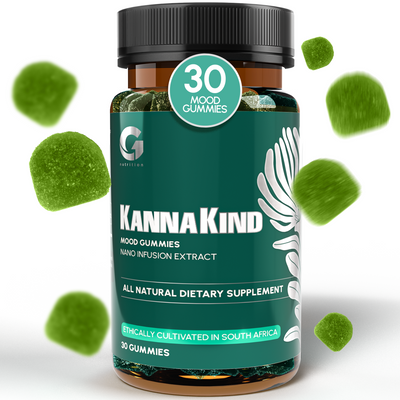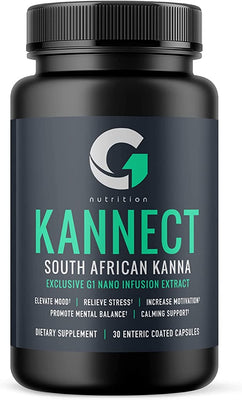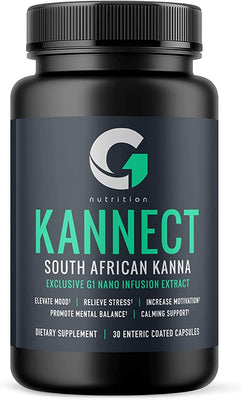You may have heard the buzz online or in wellness circles: Kanna is being called “Nature’s MDMA.” This comparison is catching, but is it accurate? While both substances are known to influence mood, lumping them together can be misleading and overlook what makes Kanna special in its own right.
This guide will clear up the confusion. We'll explore the history of Kanna, compare its effects to MDMA, and look at what science says about its benefits and risks. Our goal is to give you a clear, honest picture so you can understand what to expect from this traditional South African plant.
Disclaimer: This blog post is for informational purposes only. It is not intended to be a substitute for professional medical advice, diagnosis, or treatment. Always seek the advice of your physician or another qualified health provider with any questions you may have regarding a medical condition or before starting any new supplement.
What Is Kanna (Sceletium tortuosum)?
Before we dive into any comparisons, let's get to know the plant at the center of the discussion. Kanna, scientifically known as Sceletium tortuosum, is a succulent that grows in South Africa. It's not some new discovery; it has a rich history of traditional use that spans centuries.
Origins and Traditional Use
For hundreds, if not thousands, of years, indigenous communities of South Africa, like the Khoisan, have used Kanna. They traditionally chewed the fermented leaves, stems, and roots of the plant. It was valued for its ability to help ease thirst and hunger, reduce stress, and elevate mood during long hunts or social gatherings. Early reports from observers noted its calming and mood-enhancing properties, describing it as a plant that brought relaxation and a sense of well-being, not intense euphoria. This long history points to its role as a supportive herb used to navigate daily life challenges.
Modern Popularity
In recent years, Kanna has gained popularity in the Western world as a natural nootropic and mood enhancer. As interest in plant-based wellness grows, so does the search for supplements that can support mental and emotional health. Unfortunately, this surge in interest has also led to some sensational marketing. The nickname “Nature’s MDMA” likely arose because Kanna can create a feeling of openness and social ease for some users. However, this comparison often exaggerates the effects and creates unrealistic expectations, overshadowing its more subtle and sustainable benefits.
Does Kanna Act Like MDMA?
To answer this question, we need to look at how these two substances work in the brain. While they may share a distant, superficial similarity in influencing mood, their mechanisms and the experiences they produce are fundamentally different.
Comparing Mechanisms of Action
MDMA is known for its powerful effects, which come from causing a massive release of serotonin, along with dopamine and norepinephrine. This flood of neurotransmitters creates the intense euphoric and empathogenic feelings associated with it. However, this process can also deplete serotonin stores, often leading to a significant "crash" or low mood in the days that follow.
Kanna works very differently. Its main active compounds, called alkaloids (like mesembrine), act primarily as serotonin reuptake inhibitors (SRIs). This means Kanna helps keep more serotonin available in your brain by slowing down its reabsorption, rather than forcing a massive release. It’s a much gentler and more sustainable mechanism, similar to how some prescription antidepressants work, but with a different overall profile.
Additionally, Kanna is a phosphodiesterase 4 (PDE-4) inhibitor. Inhibiting PDE-4 has been linked to pro-cognitive and anti-inflammatory effects, which may contribute to Kanna’s ability to enhance focus and mental clarity. This dual-action mechanism is unique to Kanna and sets it far apart from MDMA’s direct and intense action. The intensity and effect profile are simply not in the same league.
Scientific Evidence on Euphoric Effects
So, does Kanna actually produce euphoria? The answer depends on your definition. Anecdotal reports from users sometimes describe a mild, temporary feeling of bliss or a pleasant "rush," especially with initial doses. However, this is typically short-lived and much less intense than the experience associated with MDMA.
Most human studies and consistent user reports focus on Kanna’s ability to promote a sense of calm, reduce feelings of anxiousness, and improve cognitive function under stress. The "empathogenic" or socially connecting effects are more subtle—think feeling more relaxed in a conversation, not an overwhelming sense of love for everyone in the room. The euphoric claims are often mild, not reproducible for every person, and far from the guaranteed, powerful effects of MDMA.
Potential Risks and Safety Considerations
Just because Kanna is a natural plant doesn't mean it is without risks. Responsible use is key, and understanding its safety profile is essential.
Side Effects
Kanna is generally well-tolerated, but some individuals may experience mild side effects, especially when starting or with higher doses. These can include:
- Mild nausea or an upset stomach
- Headaches
- A feeling of overstimulation or restlessness
These effects are often temporary and can sometimes be managed by adjusting the dosage. Starting with a very low dose can help your body acclimate and reduce the likelihood of side effects.
The most significant risk comes from potential interactions. Because Kanna works as a serotonin reuptake inhibitor, it should never be combined with SSRIs (Selective Serotonin Reuptake Inhibitors), MAOIs (Monoamine Oxidase Inhibitors), or other serotonergic medications. Combining them can lead to a dangerous condition called serotonin syndrome, where your brain has too much serotonin.
Featured Products
Misuse and Overuse Concerns
The marketing of Kanna as "Nature's MDMA" can encourage people to misuse it by taking extremely high doses in an attempt to chase a euphoric high. This is not only ineffective but also increases the risk of negative side effects. Kanna’s benefits are best realized through consistent, moderate use, not through high-dose experimentation. While safety data on very high doses is limited, it's wise to respect the plant and use it as intended for mood and cognitive support.
Who Should Avoid Kanna
Certain individuals should avoid using Kanna supplements. This includes:
- Anyone taking SSRIs, MAOIs, or other psychiatric medications.
- Pregnant or nursing women.
- Individuals with pre-existing medical conditions, especially related to heart health or blood pressure.
- Anyone under the age of 18.
As with any supplement, it is crucial to consult with your healthcare professional before adding Kanna to your routine to ensure it is safe for you.
What the Research Really Says
When you separate the hype from the science, a clearer picture of Kanna emerges. It’s a promising natural supplement for mood and cognition, but it’s not the psychoactive powerhouse some claim it to be.
Mood and Empathogenic Claims
Preclinical and human studies have begun to validate some of Kanna's traditional uses. Research suggests it can help improve mood, decrease feelings of stress, and promote a sense of calm and well-being. Studies have shown that Kanna can dampen the brain's reactivity to fear-inducing stimuli, which may explain why users report feeling less anxious.
The "empathogenic" claims are harder to pin down scientifically. While Kanna can help lower social anxiety, making interactions feel easier and more fluid, this is a far cry from the profound, chemically induced empathy associated with MDMA. The evidence points toward gentle mood support rather than a radical alteration of emotional perception.
Cognitive and Emotional Effects
Perhaps the most exciting area of research is Kanna's effect on cognition. Its action as a PDE-4 inhibitor is linked to improved mental clarity, focus, and executive function. Users often report feeling more "dialed in" and capable of handling complex tasks without the jittery feeling of stimulants.
This combination of calm and focus is what makes Kanna a unique natural nootropic. It helps quiet the mental noise that causes stress while sharpening the cognitive functions needed for productivity. These effects are fundamentally different from MDMA-style euphoria, which often impairs cognitive function.
Practical Guidance for Using Kanna
If you're interested in trying Kanna for its mood-supporting and cognitive-enhancing benefits, here’s how to approach it safely and practically.
Forms and Dosing
Kanna is available in several forms, each with its own onset and use case:
- Chewables and Teas: These are closer to traditional methods. The effects may be felt more quickly but might also be milder.
- Capsules: These provide a precise, pre-measured dose. Products like KANNECT capsules offer a straightforward way to incorporate Kanna into your daily routine. They come in different strengths, allowing you to find what works for you.
- Nano-infused Products: Modern preparations, such as KannaKind gummies, use advanced technology to increase bioavailability. This means your body may absorb the active compounds more efficiently, leading to a more consistent and noticeable effect.
When it comes to dosing, the golden rule is "start low and go slow." There is no universal dose, as it depends on your body weight, sensitivity, and the product's concentration. Begin with the lowest recommended dose on the product label and see how you feel. You can gradually increase it over several days until you find the amount that gives you the desired support. Many users report that Kanna's effects build subtly over the first few days of consistent use.
Setting Expectations
The key to a positive experience with Kanna is realistic expectations. Do not expect an intense, immediate high. Instead, look for subtle shifts in your daily experience:
- A calmer response to stressful situations.
- A brighter, more stable mood.
- Improved focus and mental endurance during work.
- Feeling more relaxed and at ease in social settings.
Combining Kanna with a healthy lifestyle—including good nutrition, regular exercise, and sufficient sleep—will maximize its benefits. Think of it as a tool to support your overall well-being, not a magic bullet.
Bottom Line: Kanna vs MDMA
So, is Kanna "Nature's MDMA"? The answer is a clear no.
This comparison is a marketing exaggeration that does a disservice to both substances. Kanna is a valuable herbal supplement with a unique mechanism of action that supports mood, calms the mind, and sharpens focus. Its effects are gentle, sustainable, and geared toward enhancing daily life, not creating an intense, psychoactive experience.
By understanding how Kanna truly works and respecting its safety guidelines, you can explore its benefits responsibly. It's not a party drug; it's a supportive plant with a long history of helping people feel more balanced and resilient. When used correctly, Kanna is a powerful ally for modern mental wellness.



